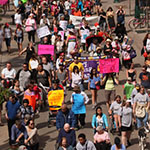 My son was born 10 years ago after a long awaited pregnancy. We knew at his birth that something was wrong. Within minutes, he was whisked away to the NICU. After many diagnostic tests and procedures, he was diagnosed with a rare genetic neurodevelopmental syndrome called Prader Willi Syndrome (PWS). His particular type of PWS occurs in approx. 1/75,000 births. My son’s birth and his consequent diagnosis was life changing for our family and of course for my son.
My son was born 10 years ago after a long awaited pregnancy. We knew at his birth that something was wrong. Within minutes, he was whisked away to the NICU. After many diagnostic tests and procedures, he was diagnosed with a rare genetic neurodevelopmental syndrome called Prader Willi Syndrome (PWS). His particular type of PWS occurs in approx. 1/75,000 births. My son’s birth and his consequent diagnosis was life changing for our family and of course for my son.
The syndrome is relentless, affecting every body system with the most pervasive symptom being insatiable hunger. There are no treatments to deal with the relentless hunger and the behavioral issues, the strongest, which is substantial anxiety. My son’s brain does not function properly nor respond to typical medical treatments or strategies. I knew at the time of diagnosis of his syndrome and over our ten year journey of caring for a son with severe disabilities, that I have unfinished business. As Viktor Frankl the psychotherapist and holocaust survivor said I have “something significant left to do” (1946: Man’s search for Meaning).
As a mother and researcher, I decided to give voice to the parent’s experience of caring for a child with a rare disease. I designed a research study asking parents to tell me their experiences of caring for medical and social needs for their children. The parent stories have been largely silenced and not understood. They reveal the difficult and complex journey of families living with a rare disease and give voice to the untold stories of this very private and difficult journey.
Fifteen parents caring for children with rare neurodevelopmental diseases were asked to share their perceptions and experience of the medical and social supports that exist for their families within their local communities.
The themes that emerged from the data set were:
1) Rarity as complexity: “All on our own”; Parents described unmet medical and social care supports due to lack of understanding and knowledge of the disease by health care providers(HCP). Parents relayed that HCPs often had not cared for children with these disorders or had limited contact with children with these diseases over the course of their profession. Parents however often had experiential and evidence informed knowledge about the disease. HCPs did not often use the parents as sources of knowledge. They did not often seek the parents perspective to help them navigate and coordinate care. To complicate the care needs even more, there is a general lack of substantive emotional, structural, respite and behavioral supports for the family which leads to significant emotional and physical drain on all members of the family.
2) Disconnect: “People don’t get it”; There were overwhelming parental narratives of medical teams working in silos instead of integrating the family’s needs as one entity. Parents had to navigate between the medical teams and coordinate care for their own children’s medical needs. This overall lack of medical coordination and collaborations extended the family’s frustration and suffering.
3) Navigators without a map?: “You have to make your own path”; The narratives spoke to parental care givers with limited energy and resources trying to navigate the complex and unknown multiple systems and power structures for access to care. Parents described having to tell their child’s and family’s story over and over again with each new medical resident, and specialist. Information was not brought forward and shared with and within medical teams. Instead the child’s issues were treated as separate entities not related to the original disease or syndrome.
4) In the ring: “Fighting for my child.” Parents relayed the stress of trying to get answers. Trying to get help. Trying to get recognition that they needed help. Parents felt they had to fight for necessary supports but due to powerful systemic structures and barriers, these supports are not always accessible or transparent. As well parents relayed a lack of appropriate medical and social supports perhaps due to misunderstanding by HCPs and social support workers of what is actually, acutely and chronically required by parents caring for their children.
The parent stories have been largely silenced and not understood. They reveal that HCPs need a more thorough understanding of crucial medical processes and social supports to address family and community needs. The narratives spoke of parents having to advocate and navigate in rough waters through hierarchical systems and uninformed practitioners. This navigation often led to anger and frustration and a general sense of hopelessness.
During important intersecting moments between health care providers, social support workers and parents, there needs to be a plan of care that is coordinated with parents and the healthcare team. This plan should be evidence- based and knowledge- informed from recent resources and sources, based on needs of the family and child, and family centered. This considers a plan which is realistic and appropriate considering the family’s needs, wants, capacities and resources.
Our findings lend support to the need for qualified supports in the medical communities and home which involve working with families by being forthcoming and transparent about what services are available and accessible depending on need. There is a need for formalized integrated partnerships and interprofessional teams centering on the care needs of children with rare disease with parents having a larger voice and participating in the team. This involves co designing a plan of care involving the family that is truly family centered and not simply suggesting families do the care.
The lack of a seamless family centred system creates the need for strong parent voices, action and agitation of the system. Anger and frustration situated in despair was evident from the narratives when trying to get support and action. These challenges and possible solutions are situated within the difficulties with large multiple systems involved in care. As researchers and HCPs we need to shift the responsibilities of family members to care for all the needs of their medically complex children with rare diseases to a broader analysis of the larger systems within health care and social support to determine what supports families truly need and how these can become more manageable and accessible.
In conclusion after conducting this study and hearing the voices of parents, I hope to illuminate these struggles in meeting medical and social supports in order to increase understanding and space for the caregivers’ experience. These stories shed light on what supports are needed to meet the complex care needs required when caring for a child with a rare disease.
For more information about this study and the results please contact:
Genevieve Currie, RN, MN at Mount Royal University, School of Nursing and Midwifery: gcurrie@mtroyal.ca
——————————————————————————————————
If you would like to share your story please contact the Disability Pride team at: Disabilityprideab@gmail.com
Your story can be in any form you like! Poem, lesson, painting, essay, song, picture; anything that shares your connection to disability.
Thanks so much!!



thank you for taking action on so important a topic. my own son has a rare heart condition called heterotaxy asplenia that affects 2-3/1,000,000. he underwent major open heart surgery last month and I am still trying to get him approved for a health para and OT PT services. it is so hard to reach the people in power!
I am actually reaching out for help with a student of mine who has PWS. I am looking for a social story so I can help this 8 year old girl learn about the differences in her brain/body so she can ultimately take control of herself. right now she is struggling with the secrecy surrounding her condition, the hiding, stealing, and lying for food. she is not understanding why she can’t have, why adults are hiding food from her , limiting portions, etc. she is very bright and capable of learning about herself. I feel like information on her level will be very helpful. before I create something I was wondering if a social story exists already and if you know where I can find one. thank you so much!
Rivky Wakszul, MS, Ed.
Educational Director
The Yaldeinu School
Hi Rivky,
Thank you reading the story and leaving a comment! We will share your comment with the author of the story and try to connect the two of you.
Thank you for all of the work you do and all the best with your son’s health.
Kind regards,
Disability Pride Alberta